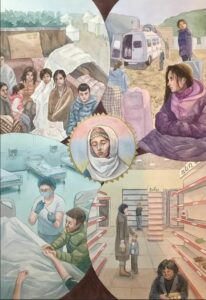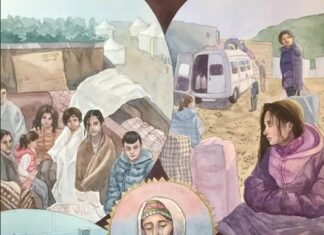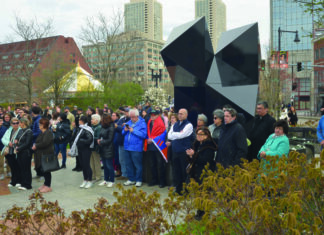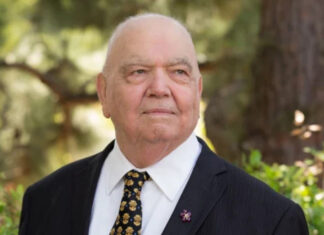By Dr. Eric Esrailian
The world has been fighting for the recognition of the Armenian Genocide for years. At a time when some global politicians are once again stoking the flames of populist nationalism, as a direct descendent of survivors, my fight to Keep the Promise and never stay silent has made me a canary in this coal mine.
For the last seven years, thanks to the support and encouragement of my late friend and mentor Kirk Kerkorian, I have been inspired to tell our story of the Armenian Genocide. Our greatest challenge was how to make this film relevant to my fellow Americans. Now, with the effects of the rising nationalism — not just in this country but around the world as well — our story couldn’t be more timely as it awaits its release. “The Promise” is not just a tale of tragedy. It also demonstrates love, hope, the plight of refugees, and the kindness of brave individuals helping those in danger. It is inspired by the testimonies of those who survived the horrific Genocide of Armenians at the hands of the Ottoman Empire.
In fact, the term “genocide” was created by Polish lawyer Raphael Lemkin in 1944, in referencing the Armenian experience and the Holocaust. However, denialists and human rights abusers have created revisionist arguments to throw up a smokescreen and deny the application of the word to the very events that defined it. Let that sink in for a moment…or 102 years worth of moments. However, the narrative of the Armenian Genocide is not only about its 1.5 million victims or the hundreds of thousands of Greeks and Assyrians who were murdered. Just as important are the Genocide’s nearly half a million survivors, whose cautionary tales of targeted raids, suppressed rights, mass deportations, starvation, concentration and slave labor camps, and mass killings reverberated in places such as Germany, Bosnia, and Rwanda, and continue to echo today within the refugee camps of those now fleeing South Sudan, Myanmar, and Syria.
There are currently more than 65 million displaced people worldwide. Eleven million of these refugees are Syrian, making the Syrian Civil War the worst humanitarian crisis since World War II. The world is now descending into fear of diversity. In many ways, today’s anti-immigrant, anti-refugee rhetoric of extreme nationalist politicians around the globe recalls the rhetoric utilized by the Ottoman Empire against Armenians. In both cases, systematic discrimination is rationalized within the context of war and the fear for national security. Silence, indifference, and denial of past atrocities only encourages and rewards this behavior. History has taught us that security and compassion are not diametrically opposed. In fact, one cannot exist without the other.
The Genocide is not a matter of historical debate. We all know it happened. The denialists know it as well as anyone else, and they have carefully wiped the crime scene down for 102 years. Offering descendants of victims an “opportunity” to relive their family’s pain through kangaroo courts is insulting and naive. Government recognition will help healing, but it will not bring back the dead or erase horrors etched on the hearts of every Armenian. False promises by politicians of both political parties have the eroded confidence of not just Armenian Americans, but that of educated observers from all backgrounds, with respect to the motivations behind people seeking elected office. We can start to change that perception by standing up for decency and the truth.









